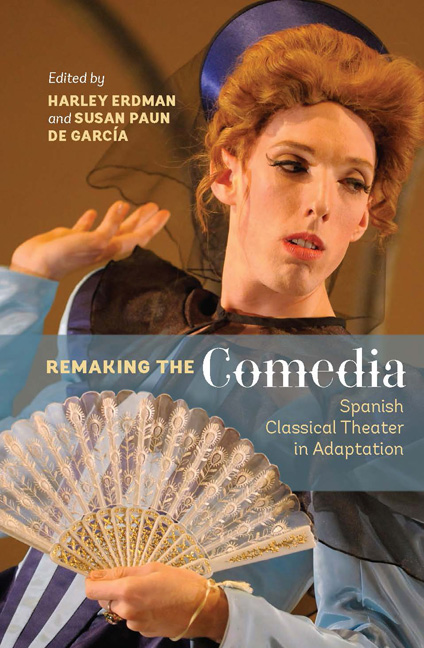Book contents
- Frontmatter
- Contents
- Illustrations
- Contributors
- Preface
- Note to the Reader
- Acknowledgements
- PART I THEORIZING
- PART II SURVEYING
- 5 Refundición Redux: Revisiting the Rewritten Comedia
- 6 Pepe Estruch and the Performance of Golden Age Drama: International Relationships under Franco and Democratic Theatrical Cultures
- 7 Thinking Globally, Acting Locally, and Performing Nationalism: Local, National, and Global Remakes of the Comedia
- 8 Four Decades of the Chamizal Siglo de Oro Drama Festival and the Evolution of Comedia Performance
- 9 Early Modern Dramaturgas: A Contemporary Performance History
- 10 Adapting Lope de Vega for the English-Speaking Stage
- PART III SPOTLIGHTING
- PART IV SHIFTING
- Play Titles Cited
- Works Cited
- Index
5 - Refundición Redux: Revisiting the Rewritten Comedia
from PART II - SURVEYING
Published online by Cambridge University Press: 05 December 2015
- Frontmatter
- Contents
- Illustrations
- Contributors
- Preface
- Note to the Reader
- Acknowledgements
- PART I THEORIZING
- PART II SURVEYING
- 5 Refundición Redux: Revisiting the Rewritten Comedia
- 6 Pepe Estruch and the Performance of Golden Age Drama: International Relationships under Franco and Democratic Theatrical Cultures
- 7 Thinking Globally, Acting Locally, and Performing Nationalism: Local, National, and Global Remakes of the Comedia
- 8 Four Decades of the Chamizal Siglo de Oro Drama Festival and the Evolution of Comedia Performance
- 9 Early Modern Dramaturgas: A Contemporary Performance History
- 10 Adapting Lope de Vega for the English-Speaking Stage
- PART III SPOTLIGHTING
- PART IV SHIFTING
- Play Titles Cited
- Works Cited
- Index
Summary
The lively Siglo de Oro theatre festivals of Almagro, Spain, and El Paso, Texas; Madrid's Teatro de la Comedia; Washington, D.C.'s GALA Hispanic Theatre; New York City's Repertorio Español; the theatre festivals of Stratford, Ontario and Stratford-upon-Avon: theatre companies and university theatre departments are today all engaged in a constantly evolving project of performing dramatic works from Europe's first national theatre, the Comedia. It is important to take note of these international theatrical efforts because for many years Spain's “Golden Age” (or early modern, as one prefers) plays languished—in comparison to England's ongoing celebration of Shakespeare—except in limited venues or classrooms as objects for reading and critique or the occasional “revival” of Lope's Fuenteovejuna or Calderón's La vida es sueño. Such widespread performances of comedias, whether in the original language and costume or “modernized,” “recast,” or “rewritten,” present us with a happy conundrum: how to define these recreated stagings. Publicity may call them “versions,” or “updates,” or “translations,” or refundiciones; those of us who engage with the Comedia, at one time strictly academically but now more often theatrically, are concerned with what these products are because these varying terms do not carry the same value. In these brief pages I propose to discuss the refundición primarily within the context of its flowering in nineteenth-century Spain but with the occasional glance at twentieth- and twenty-first-century performances, all of which appropriate the Comedia's vibrancy.
One of the most challenging tasks for a playwright and/or theatre director undertaking a classic play is to decide how faithful to remain to the original text. (Here and below I refer to actually rewriting the text, and not necessarily staging it in its original form. However, that, too, is a subject fraught with questions similar to the ones I pose immediately below.) As we cannot know for certain the original authorial intent beyond what analysis of content and context yields for the careful reader/spectator, any restaging confronts an array of possibilities.
- Type
- Chapter
- Information
- Remaking the ComediaSpanish Classical Theater in Adaptation, pp. 45 - 54Publisher: Boydell & BrewerPrint publication year: 2015



